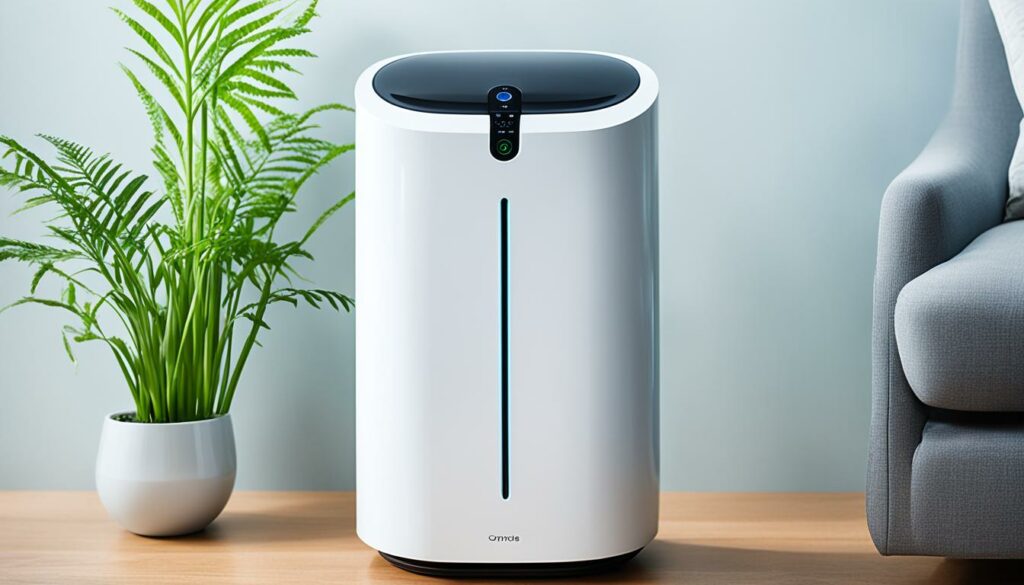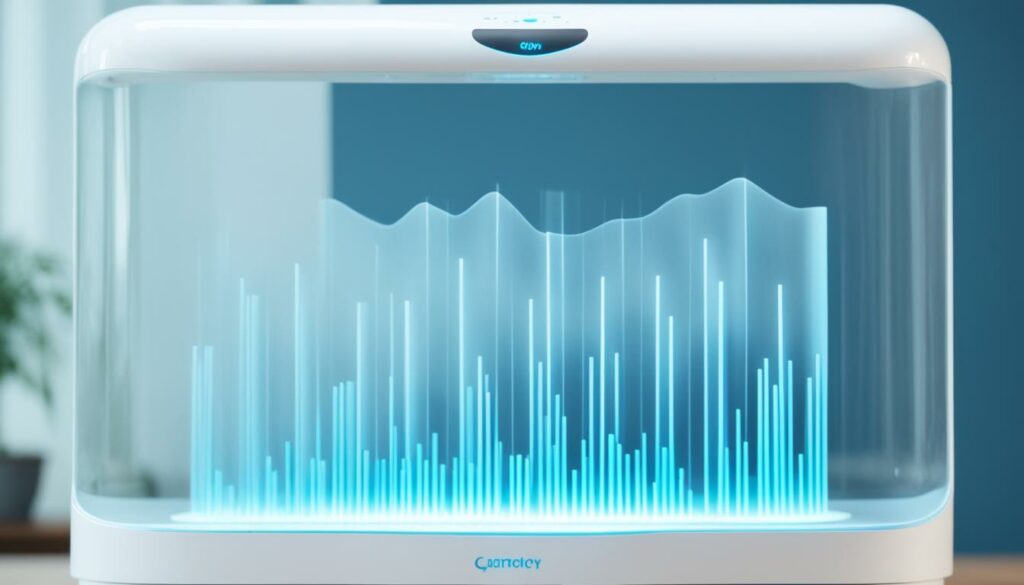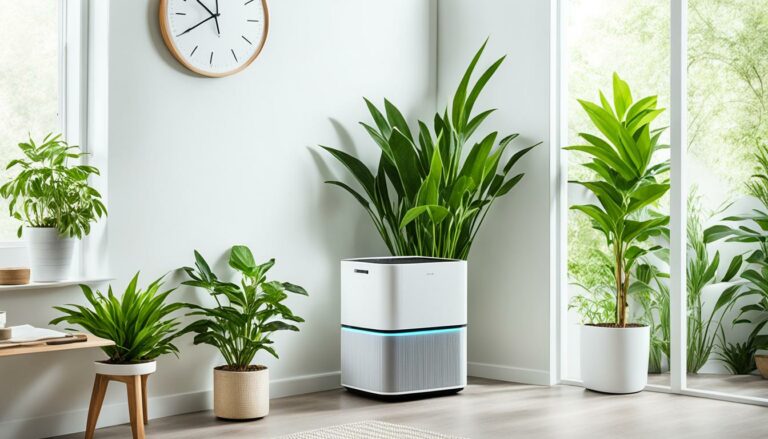Air purifiers are now key for making indoor air cleaner. People spend about 90% of their time inside, says the Environmental Protection Agency1. This means we need good air quality solutions more than ever. Things like household products, cooking fumes, and outdoor pollutants can make air bad. Using air purifiers can make the air better and help everyone stay healthier.
Choosing top-rated air purifiers is important. These devices catch harmful stuff like pollutants, allergens, and VOCs from scented products1. It’s good to keep humidity levels right and change air filters often to keep air clean1. Air purifiers do more than just help with allergies and smells. They make living spaces healthier, which can really improve your life.
Key Takeaways
- Air purifiers are vital for improving indoor air quality.
- Maintaining relative humidity between 30-50% is essential.
- HEPA filters can efficiently trap particles, meeting DOE standards.
- Regular filter changes are crucial for maintaining air purifier efficiency.
- VOCs in everyday products can impact indoor air quality significantly.
- Investments in top-rated air purifiers lead to long-term health benefits.
Understanding Indoor Air Quality
Indoor air quality (IAQ) is key to our health and comfort. We spend about 90% of our time indoors, at home, work, or school2. Many things affect indoor air, like humidity, air flow, and pollutants. Poor air flow can raise pollutant levels, hurting our health and work2.
What is Indoor Air Quality?
Indoor air quality means how clean the air is inside buildings and its impact on our health. Pollutants like chemicals from cleaners, smoke, and dust can be in the air. Bad air quality can come from not enough fresh air and high temperatures3.
Common Indoor Air Pollutants
Many pollutants make indoor air poor. Some top ones are:
- Dust mites
- Mold spores
- Volatile organic compounds (VOCs) from household products
- Gases like carbon monoxide and radon
Young kids, older people, and those with lung issues are at higher risk. They might feel eye, nose, and throat irritation, headaches, dizziness, and tiredness43. Long-term exposure can cause more serious health problems4.
Health Impacts of Poor Indoor Air Quality
It’s important to know how indoor air quality affects your health. Bad air inside can cause many health problems, especially with your lungs.
Respiratory Issues
Pollutants in indoor air can make breathing problems worse. The Environmental Protection Agency says poor air quality can cause eye irritation and serious lung diseases like asthma and chronic bronchitis5. Being exposed to pollution can also lead to more respiratory infections in kids6. Plus, it can harm lung function in children, making clean indoor air crucial for their health6.
Cognitive Effects
Bad air inside can also affect how well you think. Studies show that people do worse in work or school with poor air quality5. Having good air flow inside helps you stay focused and productive.
Long-term Health Risks
Long-term exposure to indoor pollutants is dangerous. The U.S. Environmental Protection Agency says radon causes about 21,000 lung cancer deaths each year in the U.S7.. Also, being around pollution often can lead to more heart problems and other chronic diseases67. This shows why keeping indoor air clean is so important.
How Air Purifiers Improve Indoor Air Quality
Learning how air purifiers work is key for those wanting better indoor air. Most of our time is spent indoors, making clean air crucial8. These devices use various filters to get rid of harmful particles in the air. HEPA filters, for example, catch 99.97% of particles as small as 0.3 microns, like pollen and dust mites9.
This means cleaner air and fewer allergy symptoms and breathing problems. Air purifiers also have activated carbon filters. These catch smells, smoke, and other gases, making the air fresher9. They’re great for homes with smokers or other air pollution issues10.
Air purifiers keep the air safe by filtering it constantly. Bad air inside can lead to serious health issues, causing millions of deaths each year8. Getting an air purifier is a smart way to protect your health from indoor pollution.
Types of Air Purifiers
Learning about the different air purifiers helps you choose the right one for your home. Each type uses unique technology to clean the air from various pollutants.
HEPA Air Purifiers
HEPA air purifiers are known for their top-notch performance. They remove 99.97% of particles as small as 0.3 microns. This makes them perfect for places with lots of allergens. Prices range from $30 to $300, making them affordable for many budgets11.
UV Air Purifiers
UV air purifiers use ultraviolet light to kill viruses and bacteria. They’re a great choice for those concerned about germs. Prices vary from $50 to $800, depending on the model and features11. Adding one to your setup can greatly improve your air quality.
Activated Carbon Filters
Activated carbon filters are great at getting rid of smells and chemicals in the air. They work well with HEPA and ionic purifiers to catch particles and odors12. You can expect to spend at least $100 for a good one11.
There’s a wide range of air purifiers available, so you can find one that meets your needs. Whether you want to tackle allergens, smells, or germs, there’s a purifier for you121311.
Benefits of Using Air Purifiers
Air purifiers bring many benefits to your home, especially for your health. They help reduce allergens, making the air cleaner for people sensitive to dust, pet dander, and pollutants.
Reduction of Allergens
Air purifiers catch allergens in the air. HEPA filters in these devices remove 99.97% of particles as small as 0.3 microns, including pollen and dust1415. This means less allergens at home, which is great for the 50 million Americans with allergies16. It helps reduce allergy symptoms, making the air healthier.
Minimizing Odors
Air purifiers also help get rid of bad smells from cooking, pets, or smoke. They have activated carbon filters that trap volatile organic compounds (VOCs), breaking down odor-causing gases. This makes your home smell fresher, improving your life quality.
Improvement of Sleep Quality
Clean air means better sleep. Bad air quality can disrupt sleep by causing breathing problems. An air purifier in your bedroom can greatly improve sleep by reducing airborne particles at night. This leads to deeper, more restful sleep1416. So, air purifiers boost your health and overall well-being.
Choosing the Best Air Purifiers
Finding the right air purifier means knowing what features to look for. You want one that tackles different pollutants and fits your room size. This air purifier buying guide will help you pick the best one for your needs.
Key Features to Look For
- Filter Types: Choose models with HEPA filters for removing 99.97 percent of particles like dust, mold, and pollen. Activated carbon filters also help with gas pollutants and odors, making the air cleaner17.
- Room Size Coverage: The air purifier should be able to handle your room’s size. The CDC suggests five air changes per hour for optimal performance17.
- Noise Levels: Noise is important, especially in bedrooms. Look for purifiers that are quiet but still work well.
- Energy Efficiency: Pick models that save energy to cut down on your bills.
Comparing Top-Rated Air Purifiers
When looking at air purifiers, check their prices and ratings to help you decide. Here’s a table showing some popular brands and their price ranges.
| Brand | Price Range |
|---|---|
| Alen | $200 – $750 |
| Blueair | $120 – $1,000 |
| Dyson | $300 – $700 |
| GermGuardian | $60 – $1,000 |
| Honeywell | $70 – $500 |
| Holmes | $60 – $180 |
| Hunter | $120 – $350 |
| Levoit | $50 – $500 |

This guide helps you pick the right air purifier for your home. Think about the filter types, room size, and other features to make a good choice. This way, you can keep your indoor air clean and healthy1819.
Smart Home Automation and Air Purifiers
Adding air purifiers to your smart home system helps manage indoor air quality better. Smart air purifiers let you control and check your home’s air from anywhere. This means you can keep the air clean without being there.
Integrating Air Purifiers with Smart Plugs
Using smart plugs with air purifiers makes them work together smoothly. You can set your air purifiers to turn on when you need clean air the most, like during pollen season or after cooking. These smart plugs work with Amazon Alexa or Google Assistant, so you can control them with just your voice20. This means you can check the air quality in real-time, including PM2.5, VOC levels, and humidity20.
Benefits of Smart Plug Automation
Smart plugs do more than just make things easier. They help air purifiers use less energy. Many smart air purifiers use less power and still keep the air clean20. By setting them to work at certain times, you can keep the air cleaner, especially in places with bad indoor air21. The apps for these air purifiers give you updates on air quality and when to change filters, which should be every six months22.
| Feature | Description |
|---|---|
| Remote Control | Control air purifiers from your smartphone or tablet. |
| Voice Compatibility | Works with Amazon Alexa and Google Assistant. |
| Real-time Monitoring | Continuous tracking of air quality parameters such as PM2.5 and VOC levels. |
| Energy Efficiency | Automates operation to minimize energy usage. |
| Custom Scheduling | Allows you to set specific times for operation based on your routine. |
The demand for smart air purifiers is growing, thanks to smart technology. Investing in one is a smart move for better air quality and health21.
Supporting Evidence for Air Purifiers Improve Indoor Air Quality
Air purifiers have been proven to make indoor air cleaner. Studies show they remove harmful particles from the air. This makes the air healthier to breathe.
Research Insights
HEPA filters in air purifiers can catch up to 99.97% of particles as small as 0.3μm23. This means they’re very good at cleaning the air. For example, HEPA air purifiers can cut down PM levels by 50% to 69–80%23.
Portable air cleaners are great for specific room sizes. They remove small particles that can be harmful24. The Clean Air Delivery Rate (CADR) shows how well these devices clean the air. It measures their ability to remove pollutants like smoke, dust, and pollen24.
Expert Recommendations
Experts say to choose air purifiers with HEPA filters over ion generators for better cleaning23. They recommend air purifiers for homes with people at risk, like kids and seniors. This helps protect them from indoor air pollution23.
It’s key to keep good airflow and use air cleaners that meet AHAM standards24. This ensures they work well and improve air quality the right way24.

Conclusion
Improving indoor air quality is key to a healthy home. Using air purifiers is a big step in this effort. The EPA says indoor air can be up to five times more polluted than outside air25. This shows we need strong air quality plans at home.
There are different air purifiers, like HEPA and activated carbon ones. These have been proven to cut down on airborne pollutants. They help with better sleep and fewer allergy symptoms26/25.
Studies show air purifiers make homes healthier. They help reduce risks of breathing problems and boost health overall27/25. Adding these devices to your daily life can make a big difference in your health. They can lower harmful substances like VOCs and particles linked to serious health issues26/25.
To wrap it up, air purifiers are more than just gadgets. They are vital for keeping your indoor air clean. By using them, you get cleaner air. This means better health and happiness for you and your family. It makes your home a place of long life and energy.
FAQ
What are the benefits of using air purifiers?
Air purifiers clean the air by removing dust, pet dander, and mold spores. They cut down on allergens and cooking smells. This helps people with asthma or allergies sleep better.
How do I choose the best air purifier for my needs?
Look for air purifiers with HEPA and activated carbon filters. Check the coverage area and noise levels. Read reviews to find the best one for your budget and needs.
How do air purifiers work?
Air purifiers clean the air by filtering out pollutants. HEPA filters catch tiny particles, and activated carbon filters get rid of smells and chemicals. They keep air moving and clean, making the air healthier.
What types of air purifiers are available?
There are HEPA air purifiers, UV air purifiers, and activated carbon filters. HEPA captures tiny particles, UV kills germs, and activated carbon removes smells and chemicals.
Can air purifiers help reduce indoor air pollution?
Yes, air purifiers cut down on indoor pollution. They remove dust, mold, pet dander, and chemical vapors. Using them keeps the air clean and healthy indoors.
How can smart plugs enhance air purifier efficiency?
Smart plugs let you control air purifiers automatically. You can set them to turn on at certain times or control them with your phone. This keeps the air clean and saves energy when you’re away.
Are air purifiers really effective?
Studies show air purifiers with HEPA filters cut down on airborne particles. This means fewer allergy symptoms and breathing problems. Experts say they’re great for homes with people who are easily affected by allergies.
What are common indoor air pollutants?
Indoor air can be polluted by dust mites, mold, cleaning product fumes, cooking smells, and gases from appliances. It’s important to check and fix these pollutants to keep the air safe.
- Growing Bonsai: Tips for Miniature Tree Enthusiasts
- Buying Bonsai: Tips for Selecting Your Perfect Tree
- Bonsai Potting: Essential Tips for Tree Care Success
- Bonsai Maintenance: Essential Care for Tiny Trees
- Mastering the Art of Shaping Bonsai: A Beginner’s Guide
Source Links
- Here’s 12 Ways to Improve Air Quality at Home for Better Breathing – https://www.realsimple.com/home-organizing/cleaning/how-to-improve-indoor-air-quality
- Indoor Air Quality | Quality Heating & Cooling – https://qualityheating.com/importance-of-indoor-air-quality/
- Clean Air at Home – https://www.lung.org/clean-air/indoor-air/building-type-air-resources/at-home
- The Inside Story: A Guide to Indoor Air Quality – https://www.cpsc.gov/Safety-Education/Safety-Guides/Home/The-Inside-Story-A-Guide-to-Indoor-Air-Quality
- Indoor pollution can make you sick. Here’s how to keep your home’s air clean – https://www.npr.org/sections/health-shots/2023/08/18/1194323903/air-quality-filter-purifier-indoor-pollution
- Enhancing indoor air quality –The air filter advantage – https://www.ncbi.nlm.nih.gov/pmc/articles/PMC4587002/
- Indoor Air Quality – https://www.niehs.nih.gov/health/topics/agents/indoor-air
- 12 Ways to Improve Indoor Air Quality – https://bkvenergy.com/blog/how-to-improve-indoor-air-quality/
- How Do Air Filters Improve Indoor Air Quality? – https://reimerhvac.com/how-do-air-filters-improve-indoor-air-quality/
- Do Air Purifiers Work? Research, Best Practices, and More – https://www.healthline.com/health/allergies/do-air-purifiers-work
- The Pros and Cons of the 7 Different Types of Air Purifiers – https://welterheating.com/5-types-air-purifiers/
- 5 Types of Home Air Purifiers: Pros, Cons, and How They Work – https://learn.kaiterra.com/en/air-academy/types-home-air-purifiers
- Best Air Purifier Buying Guide – Consumer Reports – https://www.consumerreports.org/appliances/air-purifiers/buying-guide/?srsltid=AfmBOopVIKxmgIdUps8786oQN3UfqvI0vSUxr4SNZc1w3mcUO6y7rwHS
- 7 Benefits of Air Purifiers – https://molekule.com/blogs/all/7-benefits-of-air-purifiers?srsltid=AfmBOopAAyjl0LY9prqQBdYVZT66LI7lGnyeWe5NNDSNvSyhVINLMgie
- Benefits of Air Purifiers | What Is an Air Purifier’s Purpose? – https://www.carrier.com/residential/en/us/products/indoor-air-quality/air-purifiers/benefits-of-air-purifiers/
- What are the Benefits of an Air Purifier? – https://airhealth.com/blog/what-are-the-benefits-of-an-air-purifier-/?srsltid=AfmBOopnkF1rDHbT20uTYG_MUkJNqpegT6kZQZNcqPt0bJFhQMzmT7yF
- Breathe Easy—We Found the Best Air Purifiers – https://www.wired.com/gallery/best-air-purifiers/
- Best Air Purifier Buying Guide – Consumer Reports – https://www.consumerreports.org/appliances/air-purifiers/buying-guide/?srsltid=AfmBOoq8qneRjPB1LJh7IE1TLw8YFM1wwaB-1MnjaPVZzAl5Bv6GdnFq
- The Best Air Purifier – https://www.nytimes.com/wirecutter/reviews/best-air-purifier/
- Smart Air Purifiers: Enhancing Convenience and Control with Technology – AirPurifiers.com – https://airpurifiers.com/tech-center/smart-air-purifiers/
- Next-Gen IoT Air Purifier: Smart Tech for Cleaner Air – https://www.intuz.com/blog/iot-enabled-smart-air-purifier
- Sensibo Pure – Pollution Sensing Smart HEPA Air Purifier – https://sensibo.com/products/sensibo-pure?srsltid=AfmBOooPIDtY-xDDG7ckE8tAPgK53OAi8PapjhEF1IRfq8lQhXyRlYR7
- Assessing effectiveness of air purifiers (HEPA) for controlling indoor particulate pollution – https://www.ncbi.nlm.nih.gov/pmc/articles/PMC8449022/
- Using a portable air cleaner to improve indoor air – https://www.canada.ca/en/health-canada/services/air-quality/indoor-air-contaminants/choosing-portable-purifier.html
- 9 Benefits of an Air Purifier – Amerisleep – https://amerisleep.com/blog/benefits-of-an-air-purifier/
- Benefits of Air Purifiers: Improve Indoor Air Quality | Midea Gulf – https://www.midea.com/gulf/blog/benefits-of-air-purifiers-improve-indoor-air-quality
- Effects of the Use of Air Purifier on Indoor Environment and Respiratory System among Healthy Adults – https://www.ncbi.nlm.nih.gov/pmc/articles/PMC7277583/


